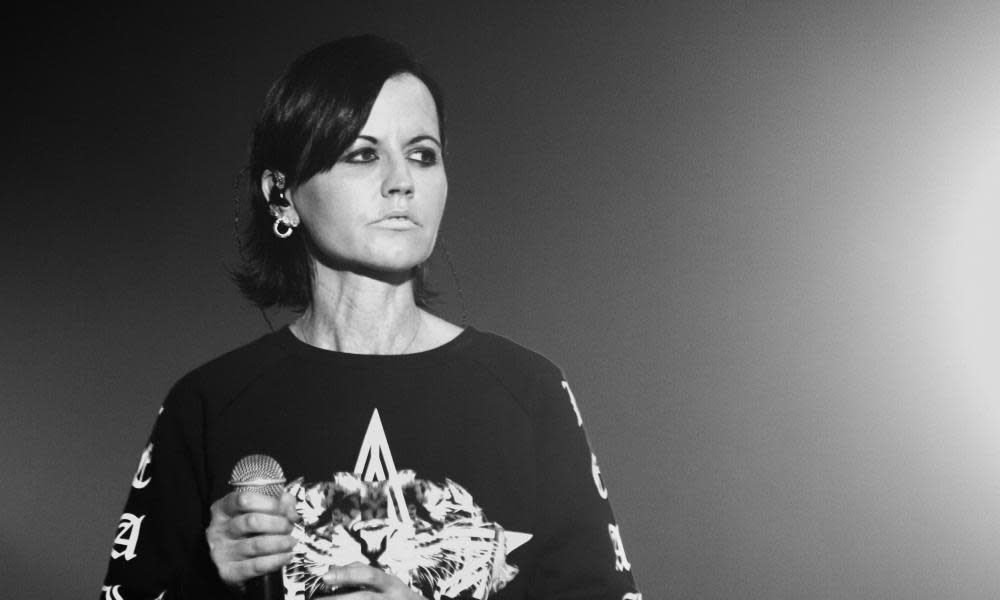Dolores O'Riordan: anguished star whose voice lingers on

The rise of the Cranberries to vast success in the US was greeted with a degree of bemusement in the UK music press. It was 1993, a year in which Suede’s debut album, the Boo Radleys’ expansive Giant Steps and Blur’s Britpop-presaging Modern Life is Rubbish figured heavily in most British publications’ best-of polls. Why, out of all the up and coming guitar bands attempting to break the States, had Americans latched onto the Limerick quartet?
They were, after all, viewed as a very minor concern in the UK. Their 1991 debut EP Uncertain had attracted some attention – it was ethereal and experimental in a way that nothing else the Cranberries recorded would be, the spectral guitar textures, feedback and echo-laden vocals of Them suggesting they were cut from similar cloth to shoegazing bands like Slowdive or Chapterhouse. But then they had signed to a major label and made a far more straightforward-sounding debut album, Everybody Else Is Doing It, So Why Can’t We?, which had more or less vanished without trace on release. To compound the bafflement, the Cranberries had been championed by American MTV while touring second on the bill to Suede, then very much considered the dernier cri in British alternative rock: why on earth had they been overlooked in favour of their support act?
The truth may be that neither Suede, nor any of the British critical favourites of the era, had a single like Linger. Today, it seems bizarre that it initially flopped on release in the UK, struggling to a feeble No 74 in the singles chart. It wasn’t particularly hip, a fact that might well have bolstered its appeal to more traditionally-minded American audiences and media looking for something less angst-ridden and disruptive as grunge, as the style came to a messy, distressing halt. But Linger was possessed of a genuinely timeless melody, a beautifully understated vocal performance by Dolores O’Riordan and a swooning string arrangement: it might have been perfectly designed to soundtrack melancholy scenes in romcoms and first dances at weddings. Afforded the exposure of heavy rotation on MTV, it took off, entering the US Top 10; its accompanying album went on to sell 5m copies in America alone. Britain duly followed suit, belatedly sending Everybody Else Is Doing It, So Why Can’t We? to No 1.
It’s easy to forget how huge the Cranberries were in the mid-90s: in the UK at least, they’ve been rather written out of history in favour of the Britpop saga. But their second album No Need to Argue outsold their debut, going seven times platinum in the US. It came in a sleeve depicting the band sitting on the same sofa that had featured on their debut, as if to reassure potential buyers that there was no alienating stylistic shift within, but featured Zombie, a harder-edged single that sounded custom-made for the kind of huge stadiums they were now filling.
If the Cranberries’ strength arguably lay in softer-hued tracks such as Twenty One and Yeats’ Grave, there was no doubting O’Riordan’s ability to convey a slightly disturbing sense of anguish in her vocal on Zombie, an anguish that may have been partly founded in her personal life. Behind the radio-friendly exterior, her life was touched by darkness. In 2013, she discussed being sexually abused as a child by a family friend, while she also found the band’s success troubling: at the height of their fame, she later said, she was “really sick and screwed up… I felt like a puppet, an object.” She suffered from anorexia, and was later diagnosed with bipolar disorder.
Perhaps understandably, the Cranberries began to struggle. The cracks started to appear with 1996’s To the Faithful Departed, a relative commercial failure, attended by a certain blustery portentousness: there were nice moments, but they existed alongside songs called War Child and Bosnia and the appalling I Just Shot John Lennon. In the wake of its release, there were cancelled tours and rumours of intra-band turmoil. 1999’s Bury the Hatchet was an improvement on its predecessor, but they finally split in 2003, and O’Riordan embarked on a fitful solo career, collaborating with Angelo Badalamenti and releasing a couple of underrated and overlooked solo albums, before the Cranberries reformed in 2009.

Clearly not all of their personal differences had been ironed out. O’Riordan attempted to sue guitarist and sometime co-writer Noel Hogan in a mysterious court case that was eventually abandoned, and kept active outside of the band: D.A.R.K. was an intriguingly gothic project with former Smiths bassist Andy Rourke, that again saw O’Riordan tapping into something bleaker than was found on the Cranberries’ hits.
Nevertheless, there was a certain pleasing circularity about their 2017 album, the acoustic and orchestral Something Else. The tracklisting revisited their back catalogue, the cover returned them to the sofa on which they had sat on the front of the albums that made them famous, and, on the beautiful opening version of Linger, Dolores O’Riordan’s voice sounded as fresh as it had ever done. Whatever else had happened in the intervening years, she was as capable of expressing a delicate sense of yearning in her forties as she had been nearly a quarter of a century before.

 Yahoo News
Yahoo News 
